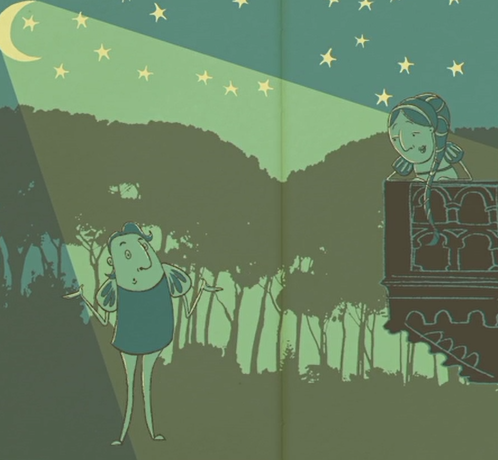Dialogue gives a story color, makes it exciting and moves it forward.
對話使故事變得生動有趣,推動著情節發展。
Romeo: O, wilt thou leave me so unsatisfied?
羅密歐:啊,難道你不打算滿足我嗎?
Juliet: What satisfaction canst thou have tonight?
朱麗葉:今晚如何才能滿足你?
Romeo: The exchange of thy love's faithful vows for mine.
羅密歐:用你忠誠的愛情誓言來交換我的誓言。
Without dialogue
如果沒有對話
So what goes into writing effective dialogue?
那么怎樣寫出對故事有利的對話呢?
Well, there are social skills: making friends, solving conflicts, being pleasant and polite.
常規的三大社交技巧:交朋友,化解沖突,表現得彬彬有禮。
We won't be using any of those today. Instead, we'll be working on, let's call them "anti-social skills."
但是我們今天不討論這些。我們今天要討論的是——“反社交技巧”。
If you're a writer, you may already have a few of these.
如果你是個作家,應該已經具備某些類似技巧了。

The first is eavesdropping.
第一個技巧是偷聽。
If you're riding a bus and hear an interesting conversation, you could write it all down.
如果你在乘車時聽到有趣的對話,應該把它們都記下來。
Of course, when you write fiction, you're not describing real people, you're making up characters.
雖然在小說里你寫的不是真實人物而是虛構的角色。
But sometimes the words you overhear can give you ideas.
但有時偷聽到的對話能為你帶來靈感。
"I did not," says one person.
“我沒做”,一個人辯解著。
"I saw you," the other replies.
“我看見你做了”,另一個人反駁。
Who might be saying those words?
這樣的對話會是誰在說呢?
Maybe it's two kids in a class, and the boy thinks the girl pushed him.
也許是班里的兩個孩子,小男孩以為小女孩推了他。
Maybe it's a couple, but one of them is a vampire, and the woman vampire saw the man flirting with a zombie. Or maybe not.
也許是一對夫妻,妻子是吸血鬼,她看到丈夫與一個僵尸調情。還有更多可能性。
Maybe the characters are a teenager and his mother, and they're supposed to be vegetarians, but the mother saw him eating a burger.
比如是兒子和母親間的對話,他們是素食主義者,但媽媽看到兒子偷吃了漢堡。












